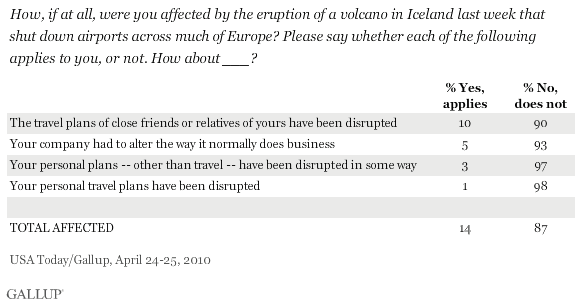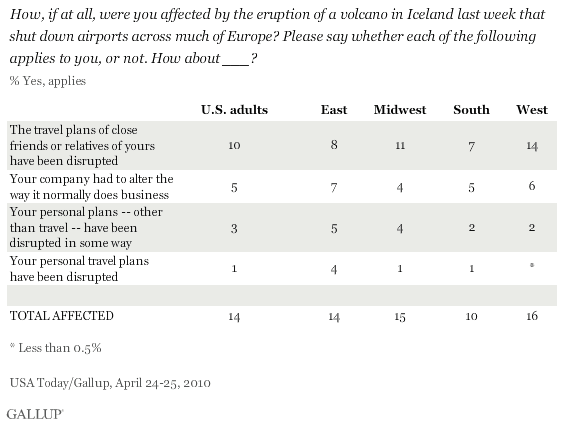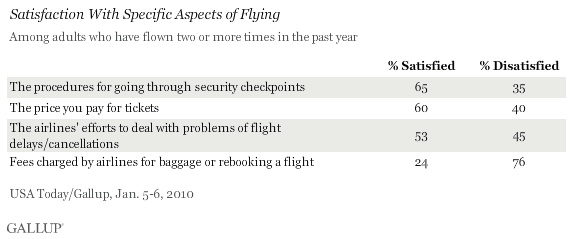WASHINGTON, D.C. -- The volcano that erupted in Iceland earlier this month affected 14% of U.S. adults in one way or another, including 1% who say their personal travel plans were disrupted, 3% who say other plans were affected, and 5% who said it disrupted their business.

The eruption of Iceland's Eyjafjallajökull volcano is estimated to have caused more than 100,000 flight cancellations between April 15 and 21, costing the airline industry $1.7 billion.
The USA Today/Gallup poll conducted April 24-25 documents the extent to which the disruptions affected individuals and businesses in the United States. Those in the East were most likely to report having their personal travel plans disrupted (4%) or having to alter the way their companies do business (7%). Those in the West and Midwest were most likely to say the travel plans of close friends or family were disrupted, at 14% and 11%, respectively.

The disruptions to the airline industry come at a time when airlines are already struggling to contain costs and limit frustrations for passengers. Well before the eruption disruptions, a USA Today/Gallup poll conducted in January found that 45% of those who have flown at least twice in the past year were dissatisfied with airlines' handling of flight delays and cancellations. Travelers are slightly more positive on security procedures and the cost of tickets, and much more negative about baggage and rebooking fees.

Because a relatively small percentage of Americans fly frequently, the volcano would be unlikely to affect the travel plans of a large percentage of Americans. In the January survey, 61% of Americans reported taking no flights at all over the previous year and another 15% reported taking just one round-trip flight during that time. About one-quarter (24%) reported taking two or more flights, including 7% who took five or more flights.

The new three-hour cutoff on tarmac delays that took effect in the U.S. Thursday is the latest rule that could affect travelers' flying experiences, for better or for worse. Still, air travelers have proven largely resilient. In the January survey, 72% of those who reported taking two or more flights during the past year said the hassles associated with air travel made them no less likely to fly; 27% said they were now more likely to take alternative transportation, such as cars, buses, or trains.
Results are based on telephone interviews with 1,029 national adults, aged 18 and older, conducted April 24-25, 2010, as part of Gallup Daily tracking. For results based on the total sample of national adults, one can say with 95% confidence that the maximum margin of sampling error is ±4 percentage points.
Results regarding airline travel and satisfaction are based on telephone interviews with a random sample of 2,017 national adults, aged 18 and older, conducted Jan. 5-6, 2010, as part of Gallup Daily tracking. For results based on the total sample of national adults, one can say with 95% confidence that the maximum margin of sampling error is ±3 percentage points. For results based on the sample of 542 Americans who have taken two or more air trips in the past year, the maximum margin of error is ±5 percentage points.
Interviews are conducted with respondents on landline telephones (for respondents with a landline telephone) and cellular phones (for respondents who are cell phone only).
In addition to sampling error, question wording and practical difficulties in conducting surveys can introduce error or bias into the findings of public opinion polls.
